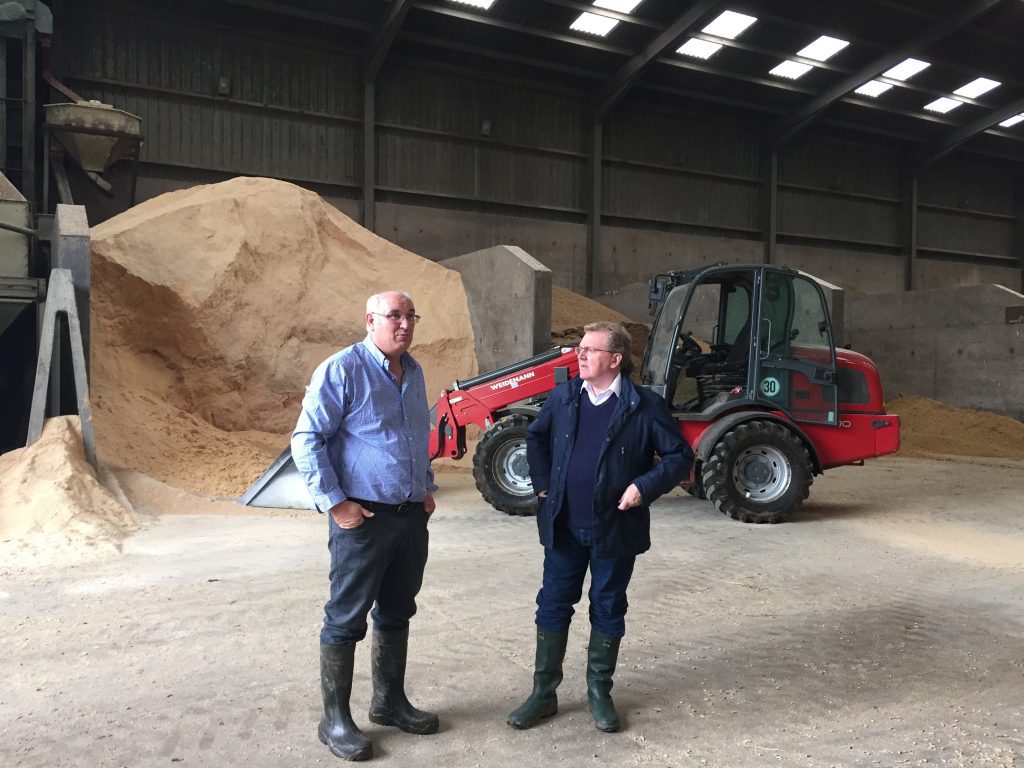Convergence, CAP, renewables and Grocery Code on the agenda
NFU Scotland welcomed Secretary of State for Scotland David Mundell onto a Dumfriesshire dairy farm today, following up a successful meeting with NFUS Board members at Westminster last month.
The meeting, within Mr Mundell’s constituency, was hosted by David and Joan Kincaid at Slacks farm, Lochmaben. It had a wide-ranging agenda that covered CAP budgets, concerns over CAP delivery in Scotland, support for the renewables sector and the need to strengthen the role of the Grocery Code Adjudicator.
Speaking after the meeting, NFU Scotland Vice President Andrew McCornick said: “Mr Mundell is very well briefed on the hugely important part farming plays in economic and environmental terms. It provides high-quality food, employment, manages the countryside and is the bedrock of the rural economy. Nowhere is that more apparent than here in Dumfries and Galloway where farming and food are a huge driver in the region’s success.
“Stability and confidence in the farming sector are still very dependent on ongoing public support through the CAP. Following up from our recent discussions in Westminster, we understand Mr Mundell has sought a ministerial meeting to discuss the allocation of the UK’s €230 million CAP convergence dividend from the EU but a date has yet to be set.
“Scotland, with the third lowest support rate in the EU, was the reason why the UK received this dividend. NFUS has been fighting since 2013 for a reconsideration of the UK Government’s decision to split this funding on the basis of historic allocations. Three separate Defra Ministers have given a commitment to review the allocation and we are seeking Mr Mundell’s assistance in bringing this matter forward.
“When discussing CAP, it was appropriate to inform Mr Mundell of our view that no CAP payments will be delivered to Scottish farm businesses within the promised December window. NFUS has called for the Scottish Government to come clean on when payments under the new CAP schemes will be with businesses and what the value of those payments will be. Without that information, farm businesses – and all ancillary businesses reliant on a stable farming industry – will find it incredibly difficult to plan and manage cashflows.
“Those cashflows are also impacted by the dysfunctional nature of our existing supply chains. Governments in all parliaments, including Westminster, must recognise the supply chain is not working and that urgent measures are required to address the immediate farming crisis across all sectors.
“Along with devolved administrations, we would like Mr Mundell to present a united UK position on the actions needed to tackle the current crisis by calling on retailers to adopt a strategic approach to preserve and promote the long term ability of Scotland and the UK to produce food. That would include clearer rules on country of origin labelling along with better, more consistent promotion of our food and a more robust public procurement food policy.
“We would also like him to commit to seeking an extension of the powers of the Groceries Code Adjudicator. Since Christine Tacon was appointed GCA in 2013 she has sought to deliver a better working environment for direct suppliers to retailers to ensure the long-term sustainability of the UK agri-food sector.
“However, relations are still breaking down as our food moves through the supply chain and it is vital that confidence between primary producers and retailers is restored at this critical time. We want Mr Mundell’s government to review the role of the GCA and consider extending her remit to receive complaints from indirect as well as direct suppliers so that transparency, efficiency and proactivity are promoted throughout the supply chain. We want farmers to develop their businesses in a food chain that has a fair share of risk and reward for all those engaged in it.
“Increasingly, farmers are looking at alternative income streams to support farm businesses and a great many Scottish farmers have taken on renewables projects to support the UK and Scotland’s ambitious energy and climate change targets.
“Farmers are regularly advised by politicians to innovate and show initiative so Westminster’s most recent approach to reducing and withdrawing supportive tariffs have hammered confidence and hit sector investment. We believe some form of pre-accreditation for renewables schemes may offer some improvement and, at Mr Mundell’s request, we will put forward a case for consideration.”
SECRETARY OF STATE FOR SCOTLAND VISITS DUMFRIES & GALLOWAY FARM





